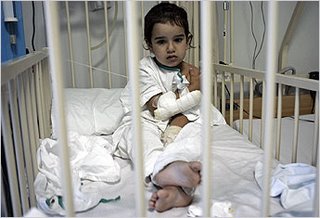Three-year-old Aya recovers at the Rafiq Hariri Hospital in Beirut, Lebanon. She was wounded along with her family when a bomb hit their building in the southern town of Bleeds where they were vacationing for the summer.
NEW YORK, USA, 31 July 2006 – In the aftermath of Sunday’s attack in Southern Lebanon’s town of Qana — which left nearly 60 people dead including 37 children — UNICEF is calling on all parties to heed the call of UN Secretary-General Kofi Annan for an immediate cessation of hostilities.
“We strongly condemn the continued targeting of civilians, particularly children,” said UNICEF Executive Director Ann M. Veneman in a statement released on the day of the attack.
Ms. Veneman today said the fact that so many women and children were in the building that was struck was a great concern for the agency.
“The untold story of what is going on in this war is that 30 per cent of those who have died are children and 45 per cent of those who are displaced are children so this is really a war that has a very, very immediate and real impact on children.”
Getting supplies south
Now in its 20th day, the conflict between Israel and Hezbollah has left 670 people dead and 3,125 injured in Lebanon alone. UNICEF believes a third are children.
For now, access to the most affected war zones remains problematic and getting emergency convoys and supplies to the country’s hardest hit areas poses logistical challenges.
For example, a journey from Beirut to Tyre in southern Lebanon would only take two hours under normal circumstances. But it has taken aid convoys up to two days to reach their destination because of the chaos and destruction.
The agency is calling for safe passage to conduct urgent humanitarian relief operations across Lebanon’s worst war zones including Qana.
“UNICEF has worked with other agencies to try and get a humanitarian convoy that is going into Qana today,” said UNICEF Deputy Director of Emergency Operations Afshan Khan.
UNICEF has been appointed the lead UN agency for water and sanitation in the conflict area. “UNICEF has provided supplies including those for water and sanitation, family packs with things like mattresses, blankets, buckets and soap to assist those who have been rendered homeless as a result of the bombardments in Qana,” said Ms. Khan.
Looking to the future
Tomorrow, a joint UN convoy of 30 trucks, including seven UNICEF trucks, will head for southern Lebanon’s towns of Nakkoura, Rmeich and Tebnine.
The convoy is carrying emergency supplies including 40,000 litres of bottled water, 110 family water kits, water purification tablets, essential drugs and recreation kits.
To protect the health of displaced children, UNICEF and its partners will start a measles campaign in Beirut on Tuesday. The vaccination campaign will be launched along with vitamin A supplementation to reach a maximum number of children living in shelters.
The immunisation drive should help prevent the spread of measles amongst the high concentration of people temporarily living in public housing who now find themselves with extremely limited access to basic health services.
The agency is also working with its partners to provide some psychological support and assistance to children who have been so severely devastated by Sunday’s attacks. Meanwhile, the humanitarian situation for civilians trapped in conflict areas remains worrying. Over the last few days, a growing number of people living in the south have been walking out of their villages to escape the violence.
“These people,” says Ms. Khan “have no access to transportation, no access to fuel and are incredibly vulnerable and exposed to get caught in crossfire.”
By Sabine Dolan
Source: UNICEF
31 July 2006: UNICEF correspondent Sabine Dolan reports on relief efforts in Beirut and southern Lebanon.
VIDEO high low


No comments:
Post a Comment